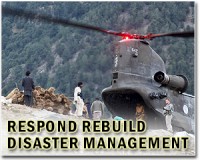| . |  |
. |
Port-Au-Prince (AFP) Nov 8, 2010 Struggling to rebuild in the grips of a cholera epidemic, quake-ravaged Haiti suffered further misery at the weekend as Hurricane Tomas claimed at least 21 lives, officials said Monday. The storm, which had already killed 14 people as it raked over the Caribbean resort island of Saint Lucia, barreled into Haiti on Friday bringing torrential rains and packing winds up to 85 miles (135 kilometers) per hour. There were chaotic scenes as the storm approached and thousands of displaced people living in flimsy tents and under tarpaulin sheets in cramped refugee camps around Port-au-Prince scrambled onto buses to evacuate. In the end the capital was spared the brunt of the storm, but Tomas submerged coastal towns like Leogane in floodwaters, triggered dangerous mudslides inland and wiped out roads and bridges, completely cutting off some rural communities from help. Worst hit was the southwestern department of Grand'Anse, where eight people were killed by Tomas. Nearly 900 Haitian homes were destroyed nationwide and another 5,000 damaged as the huge storm skirted past. As a massive clean-up was launched, civil defense officials counted the cost of Haiti's latest disaster, saying 21 people had been killed and 6,000 families made homeless, amid fears the toll could rise in locations still besieged by floodwaters. "There is an emergency in Leogane," a city about 30 kilometers (18 miles) west of Port-au-Prince hardest hit by the storm, said Alta Jean-Baptiste, director of Haiti's civil defense force. "It's completely flooded. We have begun to see the water recede, but urgent action is needed to help the population because if rains resume then there will be more flooding," she said. Roads have been severed in the north, south and southwest regions, and swathes of crops have been destroyed, Jean-Baptiste added. Much of Haiti's population of just under 10 million live in precarious conditions, vulnerable to natural disasters. Mountainsides have been stripped of trees to be used as fuel, increasing the risk of landslides. "We are going to have more victims because of the floods and mudslides, but we cannot yet reach the communities most affected," civil defense official Philippe Joseph told AFP on Sunday. Tomas was the first hurricane to batter the country since the January quake that killed 250,000 people and left more than a million homeless -- many of them forced to live in squalid tent cities. Haiti's post-quake misery had already been compounded on October 21 when health authorities announced the nation's first cholera outbreak in decades. Although easily treated, the water-borne bacterial disease has a short incubation period, sometimes just a few hours, and causes acute diarrhea that can quickly lead to severe dehydration and death. Haiti's health ministry raised the cholera toll to 544 on Monday -- an increase of more than 40 in just 48 hours -- and said almost 8,000 people were now being treated for the disease in hospital. Authorities fear the storm likely exacerbated the epidemic, with the believed source of the outbreak, the Artibonite River, flooding at the weekend. "One can predict a small increase (in cases) as the epidemic progresses and reaches other regions of the country after Hurricane Tomas," Health Ministry chief of staff Daniel Henry said. The big fear is that the disease could infiltrate the Port-au-Prince camps where people bathe, wash and cook right next to each other, spreading like wildfire in the cramped and unsanitary conditions. Aid groups are also worried about more remote areas where people cannot reach clinics or hospitals. "Outside of the larger population centers, it is critical that smaller, dispersed communities are able to access treatment," said Kate Alberti, an epidemiologist working for Doctors Without Borders. "We are very concerned about the spread of the epidemic in rural areas, where transport to existing health structures is difficult. Treatment centers need to be established and existing ones further supported in order to ensure rapid access to treatment." The source of the cholera outbreak is unclear. UN peacekeeping force MINUSTAH is probing claims its septic tanks leaked into the Artibonite and contaminated it with fecal bacteria. All this comes against the backdrop of extreme political uncertainty in post-quake Haiti with the country's 4.5 million eligible voters -- many angered over the slow pace of recovery -- set to go to the polls November 28 to choose a successor to President Rene Preval.
Share This Article With Planet Earth
Related Links Bringing Order To A World Of Disasters A world of storm and tempest When the Earth Quakes
 UN warns of aid shortfall for Pakistan flood victims
UN warns of aid shortfall for Pakistan flood victimsGeneva (AFP) Nov 5, 2010 A shortfall in international aid is jeopardising key potable water, nutrition and vaccination programmes for more than a million Pakistani flood victims, the UN Children's Fund (UNICEF) warned Friday. If significant assistance doesn't arrive by the year's end, "1.4 million people, around half of them children, will stop receiving clean water," said UNICEF spokeswoman Marixie Mercado. Th ... read more |
|
| The content herein, unless otherwise known to be public domain, are Copyright 1995-2010 - SpaceDaily. AFP and UPI Wire Stories are copyright Agence France-Presse and United Press International. ESA Portal Reports are copyright European Space Agency. All NASA sourced material is public domain. Additional copyrights may apply in whole or part to other bona fide parties. Advertising does not imply endorsement,agreement or approval of any opinions, statements or information provided by SpaceDaily on any Web page published or hosted by SpaceDaily. Privacy Statement |